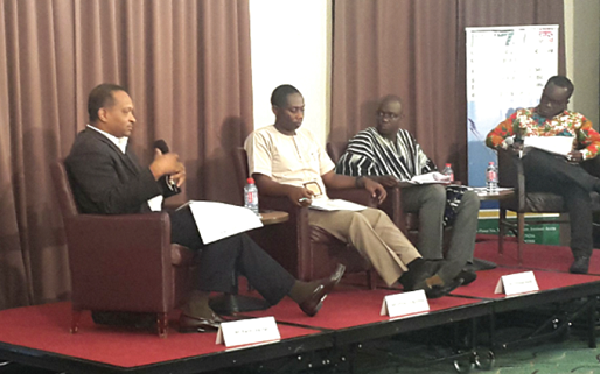
RTI provisions on extractive sector retrogressive
The Deputy Africa Director of the Natural Resource Governance Institute (NRGI), Mr Emmanuel Kuyole, has said passing the current Right to Information (RTI) Bill would be retrogressive as far as the extractive sector was concerned.
This, he explained, was as a result of non-disclosure clauses in the bill about accessing information on extractive operations, something he said would erode gains made on promoting transparency and accountability in the sector.
In an interview, Mr Kuyole said in the extractive sector, efforts have been made, especially for petroleum to have some very progressive transparency and accountability provisions in the Petroleum Revenue management Act (PRMA), 815, and ,therefore, the RTI Bill must build on the gains and not reverse it.
“It is a good bill and I think we should support to get it passed, but we have to make sure we pass a very progressive law. There are very serious non-disclosure clauses in that law, especially with respect to extractives where some information is kept confidential for whatever reasons,” he said.
He added, “We need to have a freedom to information law, but it has to be progressive otherwise we are basically going to have a law that reverses some of the gains we have already made. We don’t want a right to information law that will question why citizens want the information of companies or contracts that have been signed.”
Citing some progress made in achieving transparency in the petroleum sector, Mr Kuyole said the Ministry of Finance provided the Public Interest and Accountability Committee (PIAC) with information that is published by PIAC to enable citizens understand what was happening in the sector.
“The new Petroleum Exploration and Production (E&P) makes a provision for a registry to provide information on oil contracts and licenses. So to have a freedom of information law passed now, we have to just build on these gains,” he said.
Law not passed yet
The RTI bill has been in Parliament for over a decade now awaiting passage, something Mr Kuyole said would provide ample time for these non-disclosure clauses to be addressed before passing.
“The good thing is that the law hasn’t been passed yet, and so the point is that they should take a look at that law carefully and make sure the final product that comes out is very progressive,” he said.
Uncertain outlook
The Executive Director of the Africa Centre for Energy Policy (ACEP), Dr Mohammed Amin Adam, speaking at the forum to analyse the manifestos of the various political parties said the focus of ACEP was to make the election an issue-based one with focus on the energy and petroleum sector and to help broaden the frontiers of Ghana’s democracy through issue-based political campaigning.
He said the focus on the sector was informed by their belief that the energy sector outlook from 2017 presented significant levels of uncertainty, and ,therefore, political parties must clearly demonstrate how they intend to confront them.
Jubilee production suffered this year as a result of the production problem with the turret on which the FPSO Kwame Nkrumah is anchored. But with TEN production expected to peak in the first quarter of 2017, and first oil form Sankofa expected also in 2017, oil production is projected to reach 200,000 barrels a day.
If crude prices remain at current levels or even above it, Ghana will be making additional revenues from oil to provide significant fiscal relief for the economy.
“Given the resource constraints in our country against competing development needs, the citizens of Ghana must scrutinise the manifesto promises of the parties to determine which party has the best policy for managing and maximising the use of our oil revenue as a development opportunity,” he said.
He added, “unfortunately, beyond the projected oil production from the producing and development fields, we are likely not to add significant levels of production for a long while although most of our producing fields would have entered their natural decline phase.”
Other factors that affect the oil outlook, he said, also included the provisional ruling by the International Tribunal on the Law of the Seas on Ghana’s maritime dispute and the average period of seven long years between oil discovery and production as we strive to make new significant discoveries.